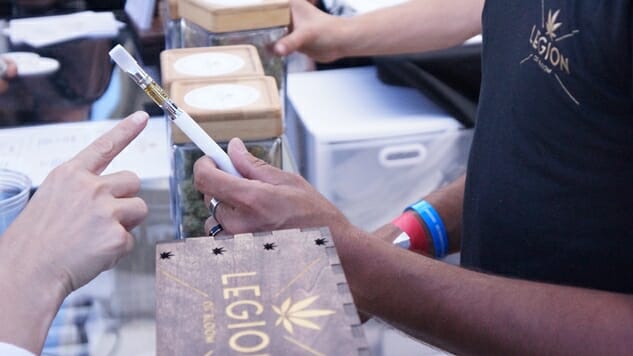Not All Cannabis is Created Equal
How Companies Like the Legion of Bloom Are Bringing CBD Into the Mainstream
Photo by Legion of Bloom
The cannabis industry got a lot more complicated on Dec. 14, when the U.S. Drug Enforcement Administration announced that it would now consider cannabidiol—known as CBD, a Schedule 1 controlled substance with no confirmed medicinal benefits. To put that in perspective, heroin is listed in the same category. Moreover, CBD is the non-psychoactive component of cannabis—it does not get you high like tetrahydrocannabinol, known as THC, which is one of the main elements in recreational marijuana smoking.
Setting aside the multitude of cannabis-smoking stereotypes, CBD has repeatedly been proven to significantly alleviate conditions such as seizures and epilepsy. This is particularly the case for younger children, and it can also aid with a multitude of cancer-related ailments such as nausea, decreased appetite, pain, and sleep issues.
The widely held perception of marijuana is that it’s a “gateway drug.” Whether or not that’s true, should that opinion deny the opportunity for others to use it for medical purposes? “Am I willing to deny something that could be beneficial to a population because I’m worried about the hypothetical risk of this becoming used recreationally…” postulated CNN’s Dr. Sanjay Gupta during an interview with Pittsburgh’s ABC affiliate WTAE. “I don’t think we should talk about medical marijuana and recreational marijuana in the same basket. These are two different things… it should be studied like any other medicine.”
The issue is that the DEA treats marijuana and its many strains and extracts as though it’s all the same illegal drug, which cannot be broken down or distinguished from the Schedule 1 controlled substance classification. Josh Kappel, a partner in the marijuana law firm Vicente Sedberg LLC, told SF Weekly earlier this month that “the problem with the DEA’s rule is that they’re defining marijuana extract as any cannabinoid derived from the cannabis plant.” Furthermore, the DEA has yet to embrace the extensive and proven research on its medicinal properties which have been conducted extensively abroad.
As a result, those who incorporate CBD into their everyday lives—whether in the form of treatment and overall well-being, or commercially sold within a business, are both shocked and concerned that CBD is illegal on a federal level. Adding to the confusion, in some states CBD consumption is legal, even though marijuana may not be.
The facts are clear; the CBD market is not going anywhere anytime soon. According to the Hemp Business Journal, the CBD industry is projected to grow to a $2.1 billion market in consumer sales by 2020, with $450 million of those sales coming from hemp-based CBD products. A recent Forbes article estimates that to be a 700% increase from 2016.
Therefore, it’s likely that you will frequently hear about medical cannabis companies in the near future. The Legion of Bloom is one company making waves in the cannabis world thanks to its commitment to organic, pure, sustainable farming practices, and careful craft cultivation. This Northern California-based company is proving itself to be an innovator in the industry by creating a fully-fledged brand that is about much more than just ‘smoking weed every day.’
-

-

-

-

-

-

-

-

-

-

-

-

-

-

-

-

-

-

-

-

-

-

-

-

-

-

-

-

-

-

-

-

-

-

-

-

-

-

-

-









































